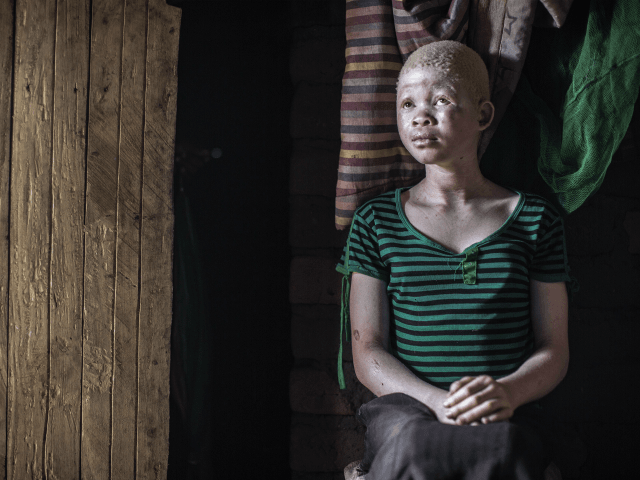The government of Mozambique launched a new conference and training session initiative in partnership with an albino rights NGO Wednesday urging citizens to cease killing, raping, and using the body parts of people with albinism in witchcraft ceremonies.
In many parts of southeastern Africa, “traditional herbalists” who practice witchcraft spread the belief that people with albinism possess magical powers. Albinism is a condition in which a person’s body does not produce pigmentation, often leaving them more sensitive to sun exposure and other risks. Many in the region hold the common belief that potions featuring the body parts of an albino person can bring good luck, help in business, win political elections, and cure diseases. Relatedly, some believe that sex with an albino woman can cure HIV/AIDS, resulting in frequent instances of rape of albino girls and women.
Witch doctor demands for albino body parts make harvesting them by killing or dismembering an albino person a lucrative business.
Deputy Minister of Gender, Child, and Social Action Lucas Mangrasse attended a conference on albinism Wednesday alongside the organization Amor a Vida (love of life), which advocates for albino rights, speaking on behalf of the executive government in condemning violent acts against albino people. The organization demanded “urgent measures” to punish attacks on albinos and prevent further violence, in the hope of achieving a 2020 with no attacks on albinos on record.
Joining Mangrasse in solidarity with the albino community was Supreme Court President Adelino Muchanga, who demanded the legislature pass tougher laws against trafficking albino body parts in remarks on Monday. Muchanga made the remarks during a visit to the city of Quelimane, which recently suffered yet another atack. The victim in this case was a nine-year-old albino boy.
The boy, whose identity remains unknown, was kidnapped and later found dead, missing his heart, genitals, eyes, arms, and feet. Authorities said the body showed signs of refrigeration, indicating that the murderers were preserving the body to sell to a willing buyer.
“The case of the murder of a boy in Quelimane is lamentable,” Muchanga said on Monday. “Unfortunately, it’s not an isolated case, since cases of the kind are reported from across the country. Our commitment, as courts, is to apply measures that discourage this sort of practice.”
Muchanga emphasized the need not just to identify and punish the murderers, but to shut down the market for albino body parts that triggers these murders.
The suspect in the Quelimane murder denies the murder charges. That did not prevent an outpouring of grief and rage in child’s neighborhood, where locals attacked and vandalized his home last week.
The Quelimane killing followed a similar attack on a 12-year-old girl in June in the city of Nampula.
The Mozambique newspaper O Pais notes that two men were sentenced to 20 years in prison for murdering and dismembering the unidentified girl, leading to calls for the government to extend the maximum sentences against albino killers. The Amor a Vida group nonetheless heralded that sentencing, and another for a 2016 albino murder lasting 40 years per convict, as a positive deterrent to those who may consider making money by killing or dismembering albino people.
Those attacks, O Pais noted, were also “tied to the trafficking of human organs, a phenomenon associated with beliefs in black magic.”
Many of these cases occur among strangers who become aware of an albino person residing near them and seek to profit from their death. In a horrifying case in September, however, a father murdered his son claiming that a healer had convinced him to sell his son’s body parts. O Pais spoke to the mother of the victim, who said that she heard her son screaming and ran to tend to him, but found both he and his father bloodied and crying.
“I asked my husband what had happened. He just kept quiet, I screamed for help, and he, trying to keep me from shouting, tried to hit me with an ax,” she said.
The healer the suspect accused of convincing him that “the dark magic would enrich him” claimed that he only later learned of the murder when the man showed up at his home bloody and asking for help.
Body parts for use in witchcraft sometimes sell even when not taking from living people. Also this month, police in the city of Nampula arrested a man caught with the bones of his father, mother, and uncle, which he exhumed from their graves. The man told police that an alleged businessman offered him a motorcycle and 20,000 Mozambican meticais ($312.05) for the bones. Police told the newspaper it was the fifth such case this year in Nampula.
Neighboring Malawi and Tanzania have long endured struggles with convincing citizens to stop killing albinos or using body parts for witchcraft. Tanzania banned witchcraft entirely in 2015, launching a nationwide operation that year to shut down witch doctors and herbalists offering to pay well for the organs.
“We have identified that witch doctors are the ones who ask people to bring albino body parts to create magical charms which they claim can get them rich. We will leave no stone unturned until we end these evil acts,” said the nation’s Home Affairs Minister, Mathias Chikawe, at the time. While the law helped Tanzanian albinos, the arrests of hundreds of witch doctors and assailants in the country led to increased attacks in Malawi, despite the police receiving “shoot to kill” orders in cases of dismemberment attacks.
In April, Malawi officials weighed the possibility of reinstating the death penalty in cases of albino witchcraft murders.
Follow Frances Martel on Facebook and Twitter.

COMMENTS
Please let us know if you're having issues with commenting.